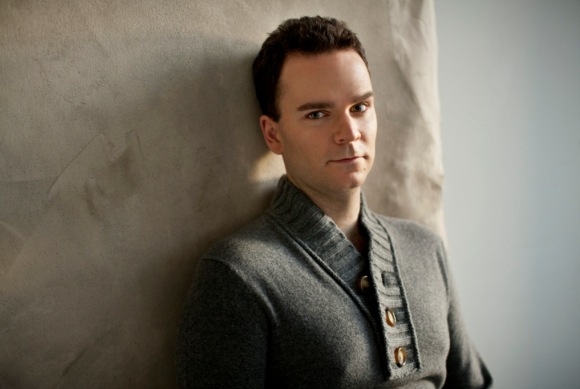Joshua Hopkins – Glyndebourne's new Argante

© Dario Acosta
The Canadian baritone Joshua Hopkins undertakes the key role of the Saracen king Argante in Glyndebourne's revival of Rinaldo in Robert Carsen's left-field production from 2011.
Hopkins has sung to critical acclaim throughout North America at opera houses including the New York Met, Canadian Opera Company, Houston Grand Opera, New York City Opera, Santa Fe Opera, Vancouver Opera and Dallas Opera. His awards include the Verbier Festival Academy’s 2008 Prix d’Honneur and the 2006 Borletti-Buitoni Trust Award.
Handel's Rinaldo is an opera with no fewer than four counter-tenors. As the only baritone among the leading roles, it’s up to you to provide the ballast. Does your role as Argante give you a chance to shine?
It certainly does. My first musical entrance is to fanfare, with brass instruments blazing. 'Sibillar gli angui d'Aletto' is a powerful and exciting aria, which immediately highlights both the extensive vocal range of Argante and shows off some spectacular vocal gymnastics through long coloratura passages. Despite Argante being the 'baddie' of the opera displaying brutish behaviour in public, he is also given the chance to show his more sensitive side when he is alone on stage, for example during his second, lyrical aria, 'Vieni, o cara'.
Director Robert Carsen chooses to set the production in a British boarding school, which is a far cry from the original setting of the Crusades. How do you feel this works and what are the strengths and weaknesses of the concept?
Honestly, I don't detect any weaknesses. It is a brilliant concept that brings a youthful and vivacious lightheartedness to the plot. While some may lament not having the chance to experience the opera as it was originally intended in its original setting, this concept makes it far more fun for the audience because they can more easily identify with the actions and impulses of each character. This adventure through the Crusades is now seen through the eyes of a bullied teenage boy, which serves to heighten the emotions of all the characters. Argante becomes a more menacing villain, battles become schoolyard brawls (and an adorable slow-motion football match at the end of the opera!), love becomes a fiery, restless, adrenaline-filled pursuit. We truly understand why Rinaldo cries for 10 minutes during 'Cara sposa' … he's a teenager!
Conductor Ottavio Dantone is something of a Handel specialist. What can we expect from him in this performance?
I haven't worked with Maestro Dantone before, but I'm certainly looking forward to learning from him and exploring the emotional truths behind Handel's glorious music. I always have great respect for a conductor who also plays an instrument during the performance. I'm sure this will bring an added level of electricity and passion to the overall experience.
What do you think it is about Handel that has brought about his revival as a major opera composer in recent decades?
Handel composed with such purity and directness. He was a knowledgeable, sensitive vocal composer and a great dramaturg. Time simply stops for arias like 'Cara sposa' and 'Lascia ch'io pianga'; they're worth the price of admission on their own. The power, beauty and vulnerability of the human voice is one of the elements that attracts us most to opera, and Handel knew how to exploit these qualities through his writing.
Last year you played the Count in Glyndebourne’s revival of Le Nozze di Figaro to great acclaim. How important is this role in your repertoire?
Mozart is the staple of my operatic existence, and Le nozze di Figaro is as close to perfect an opera as one can experience. Although I have portrayed my fair share of Papagenos (Die Zauberflöte) and a few Guglielmos (Così fan tutte), nothing quite compares to the Count's emotional journey. His lust, his anger, his power, his embarrassment, his stubborn blindness to all that happens around him… Exploring these emotional extremes satiates the hungry actor in me. Not to mention the genius of Mozart's music! I was privileged to sing 17 performances last summer, and I could happily have performed 17 more. I'm thrilled that I'll get to revisit the Count with several opera companies in upcoming seasons, one of whom will be producing the Michael Grandage production.
What are the other great roles for your voice type – those you've already played and those you’re yet to tackle?
I love singing in many different musical styles, but I'm definitely a Mozart guy at heart. I'm somewhat of a perfectionist by nature, so performing music that requires such precision really speaks to me. I haven't performed Don Giovanni yet, but I relish the hope that one day I will. That said, number one on my current wish list is Billy Budd. Britten wrote so well for the baritone voice, and Billy's innocence and enthusiasm really intrigue me. Eugene Onegin is another challenging role I would love to explore. I love playing Figaro in Il barbiere di Siviglia, and I look forward to reliving his zest for life with the Canadian Opera Company next season.
Song is a very important part of your career. How are the rewards different in performing for the stage and the concert platform?
Sadly, I don't get the opportunity to perform recitals as often as I would like. Opera is a huge ensemble effort, uniting fellow singers, a conductor, a director, orchestra musicians, etc. all contributing to the larger whole. There is safety in numbers and I feel as though I'm a part of creating something very special. There is, however, rarely any direct contact with the audience. The recital stage is a much more intimate and vulnerable platform. There are no costumes, props or sets to enhance the performance. My own soul is bared for all to see and when there is no character to inhabit, I must rely completely on my own experiences and emotions to tell the stories. A recital performance can be a frightening experience, but also extremely rewarding artistically. It becomes an evening of direct storytelling to each and every member of the audience and the bond the singer forms with each person is unlike any other.
Jon Vickers, Ben Heppner, Leopold Simoneau, Michael Schade, Teresa Stratas, Adrianne Pieczonka and (closer to you in voice type) Gerald Finley, to name a few – you are in a long line of great singers who hail from Canada. Why do you think a country with a relatively small population has produced such outstanding voices?
You could say there must be something in the water, and Canada has a lot of it! Canadians are fearless when it comes to pursuing their dreams, but I think it's the unique blend of a strong work ethic and the fact that we don't take ourselves too seriously that leads us to success. Look how many successful comedians originated in Canada! We as a nation are open thinkers, wanting to better ourselves and the world around us. Canada is also tremendous at supporting and promoting its own talent, from the local level all the way up to Government grants. Personally, I received an amazing education on full scholarship from McGill University and also received generous funding from the Québec Government to pursue my Master's degree in Music. I was also awarded grants from the Canada Council for the Arts to continue my studies after University. One of these grants gave me the resources to study with my voice teacher three times a week for four weeks, which truly kicked my technique up a few levels. It was an indispensable opportunity.
Who were your singing heroes (heroines) when you started out?
When I started out, I didn't know of any classical singers besides Luciano Pavarotti. My family never listened to classical music in the house; I grew up hearing recordings of musical theatre and, my personal favourite, original orchestral movie soundtracks. The first classical cassette tape (now I'm dating myself) my father gave me was a live concert recording of 'The Three Tenors'. I was immediately attracted to the operatic sound a voice could make, but I still had some years to discover it within myself. Although I never got to hear him perform live, Pavarotti is still one of my idols. No one rivals the ease, clarity and beauty of his voice.
I will say that Colm Wilkinson and the original cast recording of Les Misérables are the reasons I discovered I could sing at all. I was a good impersonator as a child, so when my family repeatedly played the recording of Les Mis, I memorized all the words and would privately mimic Colm's iconic version of 'Bring Him Home'. Thus, my singing voice was discovered!
Do you have any future appearances in the UK lined up after Rinaldo?
I don't have any currently, but I certainly hope another opportunity arises. I sincerely love performing here.
Handel's Rinaldo plays at Glyndebourne for seven performances between 9 and 24 August 2014.











